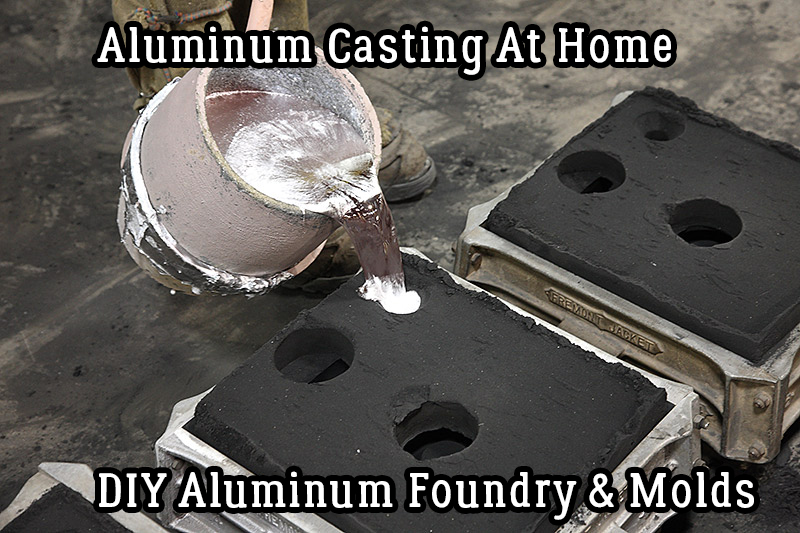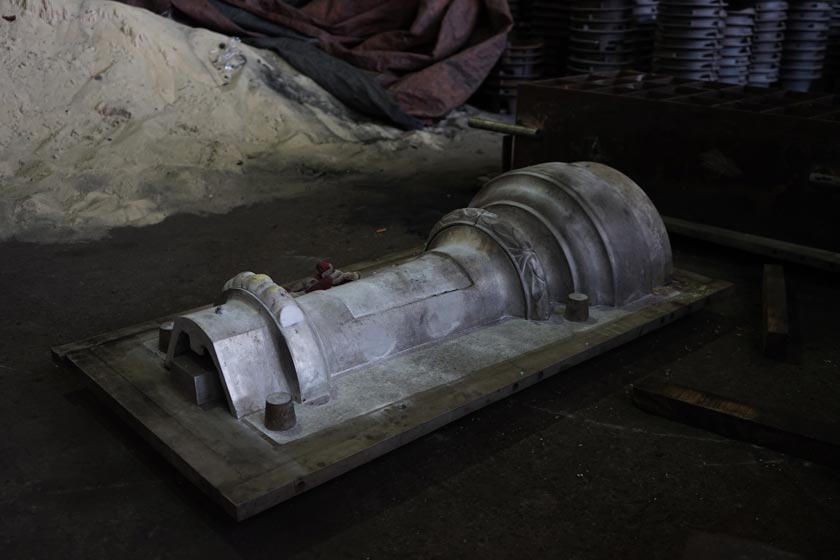When Aluminum Foundry Wisconsin improves casting results
Understanding the Advantages and Innovations in the Aluminum Foundry Sector
The Aluminum Foundry market plays an essential function in modern production. Its lightweight residential or commercial properties especially improve fuel performance, especially in automotive and aerospace sectors. Furthermore, Aluminum's resistance to corrosion assurances durability in different applications. As the sector evolves, advancements such as advanced recycling and additive manufacturing are improving manufacturing techniques. Checking out these innovations discloses not only the advantages yet likewise the challenges in advance for Aluminum shops in a quickly transforming market.
The Lightweight Advantage of Aluminum
Aluminum's light-weight nature uses considerable advantages across various markets, particularly in production and transportation. Its low thickness enables the production of components that are easier to take care of and mount, resulting in minimized labor costs and boosted effectiveness. In the automobile field, lighter lorries add to improved gas economy and reduced discharges, straightening with global sustainability objectives. Similarly, in aerospace, making use of Aluminum lowers the overall weight of airplane, which is vital for enhancing performance and decreasing functional costs.
In addition, Aluminum's lightweight homes facilitate innovative styles that were formerly impractical with larger products. This flexibility allows makers to produce complicated forms and structures while preserving architectural integrity. Generally, the light-weight benefit of Aluminum not just improves item efficiency however also drives improvements in innovation and layout, making it a recommended material in various applications.
Rust Resistance and Resilience
The Aluminum Foundry market is renowned for generating products with superior corrosion resistance, making them optimal for different applications. This home, integrated with boosted architectural stability, adds to the long-lasting performance benefits that Aluminum elements offer. Therefore, sectors increasingly count on Aluminum to meet demanding ecological problems without compromising quality.
Superior Corrosion Resistance
While various metals deal with considerable difficulties from ecological factors, Aluminum stands out for its superior corrosion resistance, making it a favored option in numerous applications. This home is largely as a result of an all-natural oxide layer that develops on the Aluminum surface area, supplying an obstacle against moisture and destructive agents. Unlike various other metals that may rust or weaken gradually, Aluminum keeps its honesty even in severe environments, such as commercial setups or coastal locations. Furthermore, its lightweight nature combined with deterioration resistance makes it optimal for applications in aerospace, automobile, and marine sectors. Generally, Aluminum's phenomenal longevity not just enhances product durability yet likewise lowers maintenance prices, offering an engaging advantage for manufacturers and consumers alike.
Boosted Structural Integrity
Engineers and designers significantly identify the importance of improved architectural honesty in modern applications, where both corrosion resistance and longevity are critical. Aluminum alloys, understood for their lightweight buildings, also show outstanding resistance to rust, making them ideal for extreme environments. The ingenious techniques used in the Aluminum Foundry industry contribute substantially to producing parts with improved toughness. Advanced casting procedures and alloy make-ups are customized to meet particular performance demands, guaranteeing that structures can endure extreme problems without compromising integrity. Additionally, surface treatments and layers boost the life expectancy of Aluminum items, further alleviating damage in time. This focus on improved structural honesty not only extends the functionality of materials however likewise decreases upkeep expenses, solidifying Aluminum's setting as a product of selection in different markets.
Durable Efficiency Conveniences
Durable efficiency in Aluminum elements is greatly credited to their premium deterioration resistance and resilience. Unlike numerous metals, Aluminum naturally forms a safety oxide layer, which protects against corrosion and degeneration in numerous environments, including marine and commercial settings. This inherent home significantly prolongs the lifespan of Aluminum items, reducing maintenance and replacement costs. In enhancement, the light-weight nature of Aluminum improves its applicability across industries without endangering stamina. The product's resistance to wear and tear additionally adds to its reliability in demanding applications, making it an optimal choice for auto, aerospace, and construction markets. As sectors progressively focus on sustainability and durability, Aluminum's efficiency benefits align with modern-day design requirements, solidifying its function in innovative production processes.
Ecological Influence and Sustainability
 As the Aluminum Foundry industry evolves, it progressively focuses on ecological effect and sustainability, identifying the need for accountable methods despite climate change. Efforts to lessen waste and energy usage are at the leading edge, with several foundries adopting recycling efforts to redeem Aluminum scrap. This not only minimizes raw product use however additionally notably cuts down energy expense, as recycled Aluminum requires only a portion of the power contrasted to main production.
As the Aluminum Foundry industry evolves, it progressively focuses on ecological effect and sustainability, identifying the need for accountable methods despite climate change. Efforts to lessen waste and energy usage are at the leading edge, with several foundries adopting recycling efforts to redeem Aluminum scrap. This not only minimizes raw product use however additionally notably cuts down energy expense, as recycled Aluminum requires only a portion of the power contrasted to main production.Advancements in emissions manage technologies are being carried out to decrease air pollutants, aligning operations with more stringent ecological regulations. Foundries are additionally exploring alternative energy resources, such as solar and wind, to power their facilities sustainably. By cultivating partnership with stakeholders, the market aims to develop ingenious options that boost eco-friendly stewardship. Jointly, these efforts highlight a commitment to decreasing the Aluminum Foundry's carbon footprint while advertising a round economic climate within the manufacturing sector.
Advanced Manufacturing Techniques
 Reinventing production processes, the Aluminum Foundry market is increasingly incorporating sophisticated production methods to enhance performance and precision. Methods such as computer system numerical control (CNC) machining and additive production have become click now vital parts in maximizing production workflows. CNC machining permits high-precision part construction, considerably reducing product waste and production time. Meanwhile, additive manufacturing opens brand-new avenues for complicated geometries and light-weight styles that were previously tough to attain.
Reinventing production processes, the Aluminum Foundry market is increasingly incorporating sophisticated production methods to enhance performance and precision. Methods such as computer system numerical control (CNC) machining and additive production have become click now vital parts in maximizing production workflows. CNC machining permits high-precision part construction, considerably reducing product waste and production time. Meanwhile, additive manufacturing opens brand-new avenues for complicated geometries and light-weight styles that were previously tough to attain.Additionally, the deployment of automation and robotics in Aluminum foundries simplifies operations, minimizes human error, and boosts worker safety. These modern technologies facilitate an even more receptive production environment, allowing manufacturers to adjust quickly to market demands. The combination of innovative simulation software application even more enhances the design and testing phases, leading to premium item quality. Jointly, these techniques not just boost operational efficiency however also foster development, positioning the Aluminum Foundry sector at the center of modern-day production.
Developments in Reusing Procedures
The Aluminum Foundry sector is not just advancing in manufacturing methods but is also making significant strides in recycling processes. Developments are arising to enhance the efficiency of reusing approaches, reducing power usage and enhancing sustainability. Advanced arranging innovations, such as automated optical sorting, make it possible for the recognition and splitting up of Aluminum from various other materials with high accuracy. This results in a higher high quality of recycled Aluminum, which is vital for preserving the honesty of the last products.
Closed-loop recycling systems are being carried out, enabling producers to reuse Aluminum scrap within their very own production procedures. This decreases waste and promotes a circular economic climate. Additionally, research study right into new recycling techniques, such as hydrometallurgical procedures, uses the potential for recovering Aluminum from complicated waste streams. These developments not check it out just add to reducing the carbon impact of the Aluminum Foundry sector however also boost its economic practicality in a significantly environmentally aware market.
Applications Across Various Industries
Numerous industries are progressively acknowledging the convenience and advantages of Aluminum Foundry products, causing prevalent applications across industries such as automobile, consumer, aerospace, and building items. In the automotive industry, Aluminum castings contribute to lightweight vehicle styles, enhancing fuel effectiveness and performance. Aerospace manufacturers utilize Aluminum components for their strength-to-weight ratio, vital for airplane frameworks and components.
In construction, Aluminum is favored for its durability and resistance to rust, making it ideal for home window structures, roof covering, and structural supports. Durable goods additionally take advantage of Aluminum Foundry products, as seen in kitchenware, electronics, and product packaging, where lightweight and recyclable products are essential.
The flexibility of Aluminum Foundry strategies permits detailed layouts and accurate specifications, providing to the diverse demands of these sectors. Because of this, Aluminum Foundry items are ending up being indispensable to modern-day manufacturing procedures throughout numerous industries.
Future Fads in Aluminum Foundries
As sectors remain to progress, Aluminum shops are poised to embrace a number of essential fads that promise to enhance performance and sustainability. One prominent trend is the raising fostering of digital innovations, including automation and fabricated knowledge, which simplify operations and boost quality assurance. On top of that, the press in the direction of sustainable practices is leading factories to invest in reusing technologies, significantly reducing waste and power consumption.
 One more arising fad is making use of innovative alloys and materials, catering to the expanding need for lightweight and resilient components throughout different sectors (Aluminum Foundry). Moreover, the combination of additive production techniques is anticipated to change component design, providing modification and lowering preparations
One more arising fad is making use of innovative alloys and materials, catering to the expanding need for lightweight and resilient components throughout different sectors (Aluminum Foundry). Moreover, the combination of additive production techniques is anticipated to change component design, providing modification and lowering preparationsCooperation with research study institutions is likewise expected to drive advancement, as shops look for to create new processes and materials. Aluminum Foundry. Jointly, these fads indicate a transformative future for the Aluminum Foundry market, lining up with wider goals of sustainability and performance
Frequently Asked Inquiries
What Are the Regular Costs Connected With Aluminum Foundry Production?
The typical costs related to Aluminum Foundry production consist of resources, labor, power, equipment upkeep, and overhead expenditures. These variables jointly influence the general monetary investment required for efficient Aluminum casting operations.
How Does Aluminum Contrast to Other Metals in Toughness?
Aluminum, while lighter than lots of metals, displays impressive strength-to-weight proportions. Contrasted to steel, Aluminum is less strong yet supplies exceptional rust resistance, making it a favorable choice in applications where weight and resilience are vital.
What Safety Measures Are in Area in Aluminum Foundries?
Safety measures in Aluminum foundries generally include required personal protective tools, air flow systems like it to manage fumes, normal devices maintenance, training programs for employees, and adherence to stringent safety and security guidelines to reduce dangers connected with liquified metal handling.
Exactly How Is Quality Assurance Managed in Aluminum Spreading Processes?
Quality control in Aluminum spreading processes entails rigorous inspections at numerous stages, including resources examination, process surveillance, and end product screening. Techniques such as analytical process control and non-destructive testing warranty adherence to market standards.
What Certifications Are Necessary for Aluminum Foundry Suppliers?
The value of qualifications for Aluminum Foundry providers includes ISO 9001 for high quality management, ISO 14001 for ecological administration, and industry-specific criteria like ASTM and SAE, making certain compliance, safety, and integrity in producing procedures.
The Aluminum Foundry industry plays an important function in modern production. The Aluminum Foundry sector is renowned for generating products with exceptional deterioration resistance, making them ideal for various applications. Transforming production procedures, the Aluminum Foundry market is progressively incorporating advanced manufacturing methods to boost performance and accuracy. The Aluminum Foundry sector is not only advancing in making techniques but is also making considerable strides in reusing processes. As markets continue to advance, Aluminum factories are positioned to accept a number of essential patterns that assure to boost performance and sustainability.